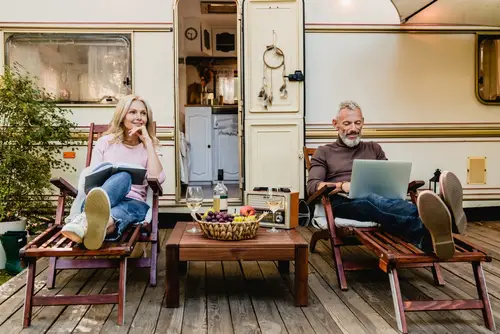1. Arriving Late at Night

Many campgrounds set quiet hours, usually around 10 p.m., to keep things peaceful for everyone. Travelers who pull in late sometimes forget that headlights, slamming doors, and shouting directions carry across the whole campsite. While you might just be trying to set up quickly, your neighbors may have been asleep for hours already. This is why campground staff often suggest arriving well before dark if possible.
Arriving late also makes it harder to set up safely. You’re fumbling with gear in the dark, increasing the chance of a noisy mishap or even damaging something. Other campers might also have dogs that bark when disturbed. Keeping to daylight arrivals avoids these issues and keeps the mood calm.
2. Leaving Food Out

A lot of travelers underestimate how quickly wildlife can sniff out food. Leaving snacks on the picnic table or scraps in an open trash bag can attract raccoons, squirrels, or even bears in some regions. This isn’t just inconvenient—it can also be dangerous, both for people and the animals. Many campgrounds explicitly require food to be stored in a vehicle or designated bear box.
Even a cooler left outside can be an invitation. Animals are incredibly persistent once they know there’s food around, and they might not leave quietly. Having a raccoon tear into your bread isn’t just messy; it can encourage animals to keep coming back. Proper storage protects everyone.
3. Ignoring Campfire Rules

Campfires are a huge part of camping culture, but they’re also one of the biggest risks. Campgrounds often have rules about fire rings, wood sources, and whether fires are allowed at all during dry spells. Some campers skip checking the posted notices and light one up anyway. Unfortunately, that simple oversight can contribute to wildfires in fire-prone areas.
Even when fires are allowed, leaving them unattended or too large is a common mistake. A small breeze can scatter embers farther than you think. Park rangers often stress the “drown, stir, and feel” method to ensure a fire is out completely. Taking those few extra minutes makes a huge difference in safety.
4. Playing Music Too Loud

It’s tempting to crank up some tunes while cooking dinner or hanging out by the fire. But most campgrounds emphasize that sound carries far more in open air than in your living room. Even if you think it’s background volume, your neighbors might hear every word of your playlist. This can seriously clash with the “peace and quiet” many campers come for.
Some places allow quiet background noise during the day but require total silence at night. Travelers often break this without realizing the impact. Remember, not everyone shares your taste in music, and some people are trying to nap or enjoy the natural sounds. Headphones are always the safest bet.
5. Letting Dogs Roam Off-Leash

Dogs love exploring new environments, but campground rules almost always require them to be on a leash. This isn’t just for the safety of other campers but also for the dog itself. Wildlife encounters, sudden vehicles, or even nearby lakes and rivers can pose risks. Many travelers assume “my dog is friendly” is enough, but the rules are there for everyone’s comfort.
Even if your pup never causes trouble, an off-leash dog can frighten children or other pets. It may also wander into someone else’s site and make a mess. Rangers often give warnings for this, but repeat issues can result in fines. Keeping the leash on keeps things safe and stress-free.
6. Washing Dishes in the Bathroom Sink

Bathrooms might seem like a convenient place to scrub dishes, but it’s a rule many campers break unknowingly. Most campgrounds prohibit this because food scraps clog the drains and create sanitation issues. Instead, they usually provide dishwashing stations or ask you to dispose of gray water at designated dump points. This keeps facilities cleaner for everyone.
It’s also more respectful to fellow campers. Nobody wants to brush their teeth in a sink full of greasy soap water. Following the posted guidelines keeps the bathroom usable and pleasant. A little extra walk to the right station makes all the difference.
7. Parking Outside Your Site

Space is usually tight in campgrounds, and parking rules are designed with safety and access in mind. Some travelers park on the grass, in front of restrooms, or along the road when their site feels cramped. This can block emergency vehicles or make it harder for others to navigate. Rangers often patrol specifically for this issue.
It may not feel like a big deal in the moment, but it impacts everyone’s experience. When you stick to the designated parking area, the campground runs smoothly. If your setup doesn’t fit, it’s worth asking staff for help instead of squeezing in where you shouldn’t. That little courtesy keeps the campground accessible.
8. Forgetting to Pick Up After Pets

Even in nature, leaving dog waste behind is a major no-no. Some travelers assume it will “decompose” quickly, but it actually introduces bacteria and parasites into the soil and water. That’s why campgrounds almost always provide pet waste stations. Ignoring this rule creates both health risks and a mess for the next camper.
Picking up after pets is about more than appearance—it’s about hygiene. Kids play on the ground, people walk barefoot, and wildlife can be affected too. A simple bag and toss into the trash keeps the site pleasant. Responsible pet owners set the tone for everyone.
9. Cutting or Gathering Wood

Many campers love the idea of collecting sticks to fuel their fire. But in most campgrounds, this is against the rules. Downed wood plays an important role in ecosystems, providing shelter for insects and nutrients for the soil. Removing it disrupts that balance, even if it seems harmless.
The other major issue is transporting wood from home or another site. This can spread invasive pests like emerald ash borer into new areas. Campgrounds typically require you to buy firewood locally to prevent this. Following those rules protects the environment in ways travelers may not realize at first.
10. Using Generators During Quiet Hours

Generators are convenient for RV travelers who want extra power. But many forget that campgrounds restrict their use during quiet hours, often 10 p.m. to 6 a.m. Even if yours is quieter than average, it still creates a constant hum that can travel far. For campers in tents nearby, it can feel like sleeping next to a lawn mower.
Respecting generator hours helps maintain the peaceful environment people come for. If you need power overnight, consider investing in extra batteries or solar options. Campgrounds enforce these rules because balance matters—your comfort shouldn’t ruin someone else’s sleep. Planning ahead avoids frustration.
11. Leaving Trash Behind

A surprisingly common mistake is leaving trash in the fire ring, thinking it will burn away. In reality, cans, foil, and plastics rarely burn completely and just create a mess. Other travelers also leave garbage bags outside, assuming they’ll deal with it later. This is both unsightly and a magnet for animals.
Most campgrounds operate under a “pack it in, pack it out” principle or provide dumpsters for disposal. Following these guidelines keeps sites clean and inviting. Leaving waste behind isn’t just lazy—it can make the entire campground feel less safe and cared for. A few extra steps to dispose properly makes a huge difference.
12. Overstaying Checkout Time

Campgrounds, like hotels, have set checkout times, often around noon. Travelers sometimes linger, thinking an extra hour won’t matter. But with new guests arriving, staff need that time to clean, reset, or check for damage. Overstaying creates a domino effect of delays.
Even if the site looks empty around you, someone else may have reserved it. Arriving at a campsite to find the previous group still lounging is frustrating and unfair. If you want extra time, many places offer late checkout for a small fee. Being mindful of timing keeps everything running smoothly.
This post 12 Campground Rules Travelers Accidentally Break All the Time was first publishe on Greenhouse Black.
